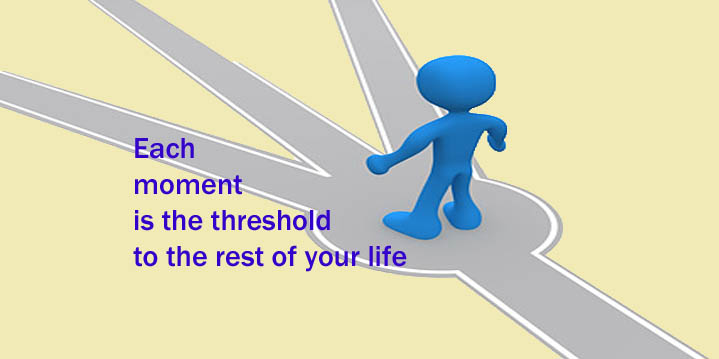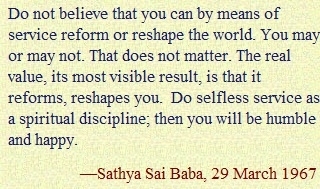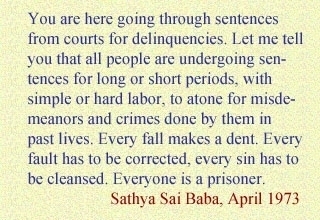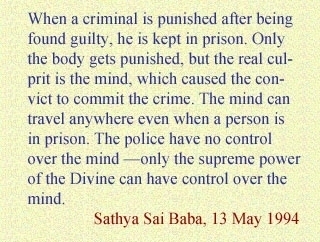

Bringing the Thresholds decision-making program to the Long Island Shelter
Since 2009, Sai devotees in Region 1 have been encouraged to explore service opportunities that go beyond the usual distribution of food and essential items to developing transformative heart-to-heart connections with those we serve. The Sathya Sai Center of Boston responded to this call by approaching the Long Island Shelter of Boston with a proposal to implement a Thresholds decision-making program specially tailored for their residents. The “Thresholds” program involves trained mentors meeting with prisoners over the course of six to eight weeks to teach them critical thinking skills in making effective decisions and solving problems in a systematic and thoughtful way. The program incorporates an easy-to-remember six-step approach to decision-making and problem-solving and is taught one-on-one, mentor to client, and augmented by group learning sessions. The Long Island Shelter is run by the City of Boston Public Health Commission and houses former prisoners who are in transition between the prison system and re-entry into society. Long Island Shelter seemed an ideal agency to work with as we had served the residents of the shelter for many years, through our soup kitchen activities and we had built a trusted relationship with the shelter administrators. So it seemed natural for us to expand our repertoire of services to the residents of the shelter to include the Thresholds decision-making program. Two Sai devotees share their experiences with the program, and how it has impacted them:
Reflection by Rama Putcha:
After the initial training workshop that was held for Sai devotees, I was really excited to begin the Thresholds program because I had never undertaken any interactive one-on-one service of this nature before. Armed with my Thresholds manual, I was all ready to go. I prayed to Sai Baba to make me a worthy instrument of His Love. Little did I realize the kind of humbling lessons I would learn through my experiences, and how it would change my entire way of thinking.
When I met with my first client, John, I was very apprehensive. His demeanor seemed cold and distant; he made no eye contact and seemed eager to leave the session. I feared that I was not going to be able to hold his attention for ten weeks. The following week, during our lessons, John’s responses were indifferent: “I don’t care”; “I don’t know”‘;” Whatever.” I finally decided to do a micro-session, a technique we had been taught, in which we examined a poem or a picture, and through this simple and nonthreatening activity, John opened up and expressed his reactions to the stimuli. Though he had a lot of negative things to say, I did not try to change his views but merely listened and encouraged him to share more about himself. I thanked the Lord for steering me in the right direction.
For the third class, I had a surprise waiting for me. Not only did John complete his homework, he had brought two glasses of water for me because he had noticed during the previous class that my throat was getting parched from talking. This time, he trusted me enough to talk about his life and his pain. He had started his drug use at a very young age and by age 16, he was robbing to buy drugs. At 17, he was charged with manslaughter and was sentenced to a 35-year jail sentence. Now, his father was dead while his mother was in an old-age home and had terminal cancer. He reminisced about his childhood days with a distant look in his eyes and a smile on his face. His fondest memories were of going to church every Sunday with his family, singing in the church choir, and spoke of the joy of visiting his grandparents’ house for lunch. His story was truly heart wrenching for me to hear. How one’s life could change on a dime! As Swami says, no one can escape one’s karma.
During all subsequent classes, John was full of enthusiasm. He was learning things that he had never given thought to earlier! He shared that he was learning to respond and not react to other people. Another resident remarked about the changes he had observed in John’s behavior—that he had become calmer, more friendly and thoughtful. John mentioned during every class that he was determined to leave the shelter as a good person so that his mother would be proud of him. His immediate goal was to get a job, rent an apartment, bring his mother home and take care of her until her end.
On the day of our last class, I came to the shelter with much enthusiasm, but when I got to the study hall, John was not there. The coordinator said, without sharing any specifics that John had been sent back to jail. I felt like I had been stung. What happened? Why? How? I could not stop thinking about John, his sick mother, and his dream of taking care of his mother, all shattered by whatever he did. I went home, sat down in front of our altar , and shed a few tears. I questioned myself: why was I crying? Obviously I was seeking and expecting an outcome from this experience. Was it my own personal joy? Was it a sense of accomplishment? While looking into Swami’s eyes in the picture, it struck me like a thunderbolt that I was only an instrument in His hands. What right had I to expect an outcome and feel disappointed? My duty was but to act and surrender the outcome: “Na hum kartha, Hari Kartha” (I am not the doer; God is the doer). I let go of John, promised myself never to be attached to the outcome again and looked forward to meeting with my next client the following week.
My second client was Rob, a well-mannered, cheerful man of 50 years. His story was similar to those many others in that shelter. Abandoned by his father in infancy and motherless at the age of 8, Rob found solace in mingling with street kids who taught him to do drugs and eventually sell drugs when he was barely 14 years old. He thought that it was a quick way to get rich. At age 15, he was caught and sent to jail, and then continued in and out of jail all his life. During one of the periods he was out of jail, he fathered a little girl before returning to jail. His girlfriend kept in touch with him and brought their daughter to visit him regularly. Being away from his daughter pained Rob immensely. Now that his daughter was almost 18 and getting ready to go to college, he was determined to get out of prison once and for all, work hard, and pay for his daughter‘s education. From the very first day, Rob showed keen interest in the program. He was awed by the essence of what he was learning during our sessions. He would blurt out, “I never thought this way before.” It was such a joy to hear him say, “This makes so much sense. Nobody talked to me this way before. Had I known there was another way, I would never have done things that sent me to jail. Can I have another copy of this quote? I want to give it to my daughter.”
There was one big challenge. Rob could not write. At best, he knew his alphabet, but he could not spell even the simplest word. It took us more than four sessions (four weeks) to complete the first chapter. My first impulse was to spell the words for him, but then I realized that Swami had thrown this challenge at me for a purpose. He wanted me to exercise patience, a virtue that I lacked. He wanted me to be an instrument in teaching Rob to write. To me, helping Rob get the Thresholds certificate after 10 weeks became not as important as Rob learning to write independently and developing self-esteem. So, I stopped spelling the words for him; instead, I sounded out the words bit by bit and asked him to figure them out. It was hard for him and he struggled, but he never gave up. He put in very sincere efforts and made great progress. He was regular and punctual to class. Because of his inability to write, he could not do much by way of homework on his own, but I was very glad to see his progress in writing skills.
Ten weeks passed, and we still had one more chapter to go, but Rob did not show up to the last class. The shelter’s program coordinator told me that Rob had a job working on the shelter’s farm. I felt happy for Rob but wished he had completed his course. I asked the coordinator if Rob could be given permission to attend one more class to complete the course. The program coordinator promised to talk to Rob’s supervisor and would get back to me. I did not have any expectations; it was all divine will. So I was pleasantly surprised by good news that Rob had been granted permission to attend another class. He showed up cheerfully the subsequent week and wanted to out in extra time and finish the chapter. So, we did just that! When Rob received his certificate, he read and re-read it several times with pride and joy shining on his face. He told me repeatedly that he was now a transformed person and knew how to make good decisions. These experiences have deepened my understanding of patience and taught me not to expect any desired outcome when I render a service in the name of Sai Baba. I just feel blessed to be an instrument of His love. I pray for continued guidance so I become worthy of being Your instrument."
Reflection by Jaso Kuga: http://vimeo.com/5860725
Additional Info
For more on the Thresholds program, see:
Prison Service: Thresholds program 1
Prison Service: Thresholds program 2
Thresholds Program with Women Prisoners – Norwalk CT
Thresholds Program in a Transition Shelter - Shrewsbury MA
To learn more about or join this service project, you may go to: http://us.sathyasai.org/index.htmland click on the state or city in which the Sai Center project takes place. Click on “Email us for information about these Centers.” A local contact will respond to your email.
Keywords
Transitional Facility | Prison services |Thresholds Decision-making and problem-solving skills program |Long Island Shelter, Boston, MA| Sathya Sai Center of Boston, Massachusetts | USA Region 1 | Sathya Sai Service projects USA |Project Details
Project start: 01/01/09
Project completion: 12/31/11
Stage of development:
Zone name: US. Canada, West Indies, Israel
Lat/Longitude: 42° 21' N -71° 3' W
Affiliation: Sathya Sai Center of Boston, MA
Service category: Prison service
Author: Rama Putcha & Jaso Kuga
Project leader: Jaso Kuga


